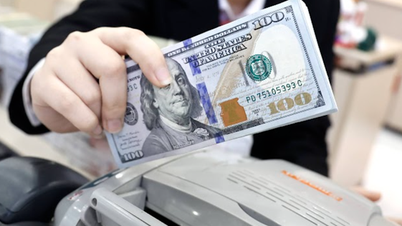
Consumers shop for shoes at Biti's - Photo: BITI'S
On the morning of May 9, the Ho Chi Minh City Investment and Trade Promotion Center (ITPC) in collaboration with the US-Vietnam Business Council (UVBC) organized a workshop on "US Reciprocal Tax: Preparation of Vietnamese Enterprises".
Vietnam is making efforts to negotiate, with the orientation of persistently pursuing the goal of building balanced and sustainable bilateral trade relations.
At the same time, the Government encourages businesses to exploit the domestic market, control the origin of goods and support businesses of the two countries to promote investment and trade cooperation.
Mr. Tran Luong Son, director of the entrepreneurship program at SUNY Cobleskill - New York University (USA), business development consultant at UVBC, gave some strategic suggestions to help Vietnamese businesses adapt.
According to him, US tax policy has shifted from prioritizing free trade to strategic trade, focusing on industrial policy and national security.
Vietnam is seen as an attractive destination in the "China + 1" strategy, but also faces close scrutiny from the US on issues of goods, labor, labeling and rules of origin.
To adapt flexibly, Mr. Son proposed three main strategic directions for the business community.
The first is compliance with international standards. Enterprises need to strengthen supply chain documentation, ensure transparent labeling of origin and promptly apply US and EU standards.
The second is to upgrade the value chain, gradually converting from the OEM manufacturing model to the original brand manufacturer (OBM) model as Biti's and Vina Giay have done.
Mr. Son also proposed to recall Vietnamese products labeled "Made in Thailand", invest in branding, innovation and find solutions to master the customer base (overseas Vietnamese).
Third, proactively strengthen engagement with trade associations and policymakers, demonstrating that Vietnam is a reliable partner.
At the same time, Mr. Son also emphasized the importance of building national and industry brands, helping Vietnam transform its image from a "cheap producer" to a "reputable supplier", possessing unique, high-value products such as agricultural products, handicrafts, and seafood.
Industry branding needs to be based on quality, sustainability, compliance and trust. This is important in the current international tariff and regulatory landscape that requires higher levels of trust and traceability.
From a technical perspective, Mr. Mohammed Selia, CEO of Fulfill Plus Company (providing logistics and order fulfillment services), noted that businesses must clearly understand how to calculate US import taxes, which are paid upon customs clearance at the port of entry and determined based on the HTS code, declared value and origin of the goods.
Each industry has its own tax rates and requirements. For example, Mohammed cited clothing and apparel as an example, where tax rates range from 10% to 30% and strict Federal Trade Commission (FTC) labeling requirements and accurate product classification are required.
The furniture industry, especially wood products, needs to be mindful of antidumping duty risks and must comply with the Lacey Act. Some states, such as California, also have their own flame retardant requirements.
For agricultural and seafood products, FDA/USDA registration and pre-import declaration are required and in many cases, cold chain storage is required.
In contrast, handicrafts often enjoy low or no taxes, but should avoid using prohibited animal-derived materials and are suitable for trading on platforms such as Etsy, Amazon Handmade and direct-to-consumer (DTC) channels.
Footwear products in particular often have high tax rates, often over 30%, classified based on materials and design, requiring careful preparation of documents.
Importers can also explore the De Minimis Rule - Section 321, an element that allows the import of shipments valued at or below $800, as a flexible approach to the US market.
Source: https://tuoitre.vn/thich-ung-thue-my-tang-tiep-can-khach-hang-kieu-bao-20250509193303686.htm







![[Photo] Prime Minister Pham Minh Chinh chairs a meeting of the Steering Committee for key projects in the transport sector.](https://vphoto.vietnam.vn/thumb/1200x675/vietnam/resource/IMAGE/2025/5/10/0f4a774f29ce4699b015316413a1d09e)





















































































Comment (0)